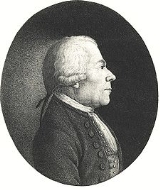
Ernst Gottfried Baldinger
Encyclopedia
Ernst Gottfried Baldinger (13 May 1738 – 21 January 1804), German
physician
, was born near Erfurt
.
He studied medicine at Erfurt
, Halle and Jena, earning his MD in 1760 under the guidance of Christoph Mangold
and in 1761 was entrusted with the superintendence of the military hospitals connected with the Prussia
n encampment near Torgau
.
He published a treatise in 1765, De Militum Morbis, which met with a favourable reception. In 1768 he became professor of medicine at Jena, which he left in 1773 for Göttingen, and in 1785 he moved to Marburg, where he died of apoplexy
on 21 January 1804.
Among his pupils were Samuel Thomas Sommerring, Johann Friedrich Blumenbach
, and Johann Christian Wiegleb
. He wrote approximately eighty-four separate treatises, in addition to numerous papers scattered through various collections and journals.
Germany
Germany , officially the Federal Republic of Germany , is a federal parliamentary republic in Europe. The country consists of 16 states while the capital and largest city is Berlin. Germany covers an area of 357,021 km2 and has a largely temperate seasonal climate...
physician
Physician
A physician is a health care provider who practices the profession of medicine, which is concerned with promoting, maintaining or restoring human health through the study, diagnosis, and treatment of disease, injury and other physical and mental impairments...
, was born near Erfurt
Erfurt
Erfurt is the capital city of Thuringia and the main city nearest to the geographical centre of Germany, located 100 km SW of Leipzig, 150 km N of Nuremberg and 180 km SE of Hannover. Erfurt Airport can be reached by plane via Munich. It lies in the southern part of the Thuringian...
.
He studied medicine at Erfurt
Erfurt
Erfurt is the capital city of Thuringia and the main city nearest to the geographical centre of Germany, located 100 km SW of Leipzig, 150 km N of Nuremberg and 180 km SE of Hannover. Erfurt Airport can be reached by plane via Munich. It lies in the southern part of the Thuringian...
, Halle and Jena, earning his MD in 1760 under the guidance of Christoph Mangold
Christoph Mangold
Christoph Andreas Mangold was a professor of anatomy, who also studied chemistry. He is known for his studies of gunpowder and cinnabar as well as the idea that medical diagnosis should be based upon symptoms, laboratory tests and comparisons with other patients. He was notably the advisor of Ernst...
and in 1761 was entrusted with the superintendence of the military hospitals connected with the Prussia
Prussia
Prussia was a German kingdom and historic state originating out of the Duchy of Prussia and the Margraviate of Brandenburg. For centuries, the House of Hohenzollern ruled Prussia, successfully expanding its size by way of an unusually well-organized and effective army. Prussia shaped the history...
n encampment near Torgau
Torgau
Torgau is a town on the banks of the Elbe in northwestern Saxony, Germany. It is the capital of the district Nordsachsen.Outside Germany, the town is most well known as the place where during the Second World War, United States Army forces coming from the west met with forces of the Soviet Union...
.
He published a treatise in 1765, De Militum Morbis, which met with a favourable reception. In 1768 he became professor of medicine at Jena, which he left in 1773 for Göttingen, and in 1785 he moved to Marburg, where he died of apoplexy
Apoplexy
Apoplexy is a medical term, which can be used to describe 'bleeding' in a stroke . Without further specification, it is rather outdated in use. Today it is used only for specific conditions, such as pituitary apoplexy and ovarian apoplexy. In common speech, it is used non-medically to mean a state...
on 21 January 1804.
Among his pupils were Samuel Thomas Sommerring, Johann Friedrich Blumenbach
Johann Friedrich Blumenbach
Johann Friedrich Blumenbach was a German physician, physiologist and anthropologist, one of the first to explore the study of mankind as an aspect of natural history, whose teachings in comparative anatomy were applied to classification of what he called human races, of which he determined...
, and Johann Christian Wiegleb
Johann Christian Wiegleb
Johann Christian Wiegleb was a notable German druggist and early innovator of chemistry as a science.He was notably the teacher of Johann Friedrich August Gottling.-References:...
. He wrote approximately eighty-four separate treatises, in addition to numerous papers scattered through various collections and journals.

